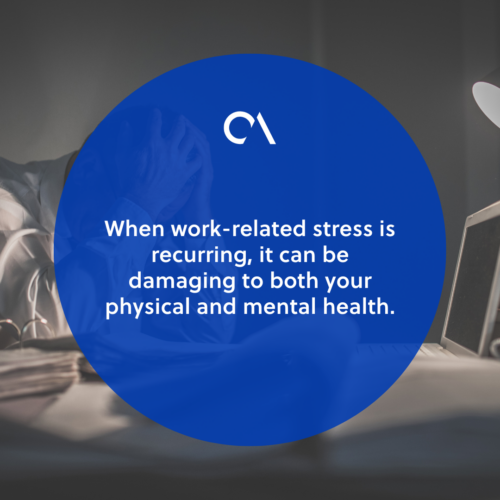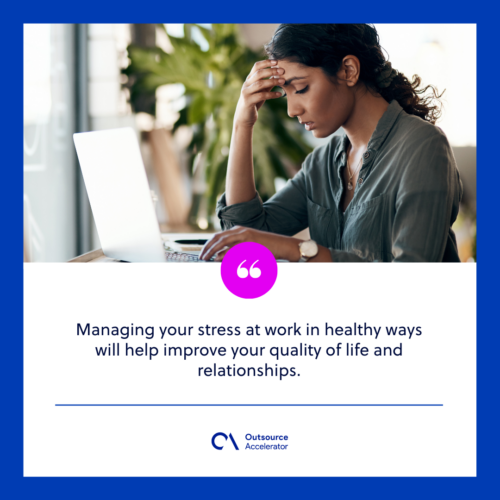6 Powerful ways to manage stress in the workplace

Work-related stress is inevitable when left unmanaged. As working individuals, there will come a time when everything becomes overwhelming. You may feel the pressure and fatigue coming from trying to figure out a new role, chasing after deadlines, or handling heavy workloads.
When work-related stress is recurring, it can be damaging to both your physical and mental health. Tensions in a working environment may be unavoidable, but there are various ways to manage stress in the workplace.
What causes stress in the workplace?
Stress at work is inevitable, but it should be kept at a minimum. It is vital to differentiate what is normal from excessive stress.
Extreme stress at work can affect your work productivity. It will also have an impact on the way you interact with the people around you, particularly your teammates and colleagues – and even the people you live with.
Sources of work-related stress
There are several factors that trigger work-related stress. Some of these work environment stressors include the following:
- Enormous workload
- Low salary
- Pressure in meeting job expectations
- Micromanaging or not having enough control over making any job decision
- Not having enough social support
- Contradicting demands or unclear expectations
- Worrying about being laid off

Signs of excessive work-related stress
Stress at work will not magically disappear the moment you leave your office. When it becomes persistent, it may heavily affect your mental and physical wellbeing.
Here are some of the most common signs and symptoms of excessive stress:
- Fatigue
- Insomnia
- Anxiousness
- Irritability
- Depression
- Weakened immune system
- Stomach problems
- Trouble concentrating
- Headaches
- Social withdrawal
These signs and symptoms may not be obvious or manifest all at once. Moreso, other working individuals who suffer from extreme work-related stress do not exhibit the same signs and symptoms as others.
6 Ways to manage stress in the workplace
People experiencing extreme workplace stress develop unhealthy habits in dealing with situations. Some turn to alcohol, drugs or cigarettes as their way of coping methods. Others tend to eat excessively, particularly junk food, sugary drinks, and more unhealthy food.
Managing your stress at work in healthy ways will help improve your quality of life and relationships. It will also keep you from suffering serious mental or physical illness and losing your job.
Recognize your stressors
The first step in coping with work-related stress is to identify what your common stressors are. You can do this by keeping a journal and recording the situations that trigger your emotion and how you usually respond to them.
In your journal, write down your thoughts, the situation, physical setting, including the people involved, and how you reacted. This will help you figure out certain patterns in your stressors and how you deal with every circumstance.
Have a healthy response
It’s easy to dive into unhealthy habits. Rather than making poor choices, think about what’s best for yourself and go for it.
Whenever you feel any tension from work, know that any physical activity is always helpful. Exercising can help you blow off some steam. Yoga can also help you relax and clear your mind.
Developing healthy habits is very important. It’s not just about physical activity either. It can simply be reading a book, going to museums, or giving yourself time to rest.
Having enough sleep is essential. So is spending quality time with your loved ones. Whatever it is, make sure that it brings you comfort, relief, and contentment.
Establish a work-life boundary
Create some boundaries between your work and your life outside of work. Once you clock out of work, try not to answer work-related phone calls or emails. Give yourself the time to rest and recharge for the next working day.

Take some time to relax and recharge
Take advantage of your days off work to recharge and relax once in a while. Especially when you feel burned out. Plan to have time to switch off of work and unwind. It will help your recovery process and restore your drive to work harder.
Learning how to relax at work can also go a long way. Practice some breathing exercises, meditate, or simply go for a short walk to help you manage your stress.
Talk to your manager or employer
Don’t be afraid to talk to your manager or employer about what causes your stress at work. Effective communication also lets you build a good working relationship with your upper management.
Understand that it is not just about you laying out complaints. Rather it is a chance for the management to come up with effective plans to promote a healthier working environment. It can also open up other opportunities to enrich the entire workforce’s skills and wellness.
There are companies that seriously consider providing necessary programs and resources for employee wellness, growth and development as part of their business values. Others even go so far as revamping their offices to provide a safe and comfortable space for their employees.
Seek support
There are employers who also provide you with specific resources to help employees cope with stress. This may be in the form of an employee assistance program, counseling, or referral to therapists and stress management consultants.
Seeking support from your friends, family members, or colleagues will also help a lot in managing your stress. If it becomes persistent and overbearing, seek help from a mental health professional.
Beyond these tips, know that you always have the power to control and overcome your emotions and situation.







 Independent
Independent




